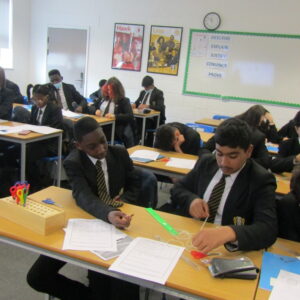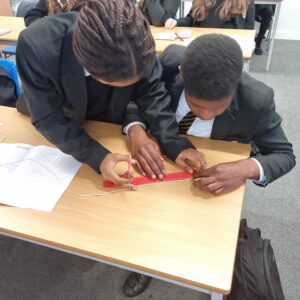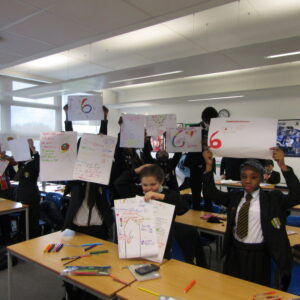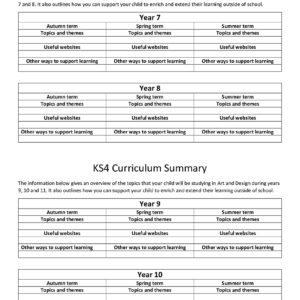Welcome to the Mathematics department at Eastbrook School. Within the wider school ‘Character and Academics’ approach to curriculum, over a five to seven-year developmental journey, our intention is that students will gain specific knowledge, practice skills with ever increasing complexity and demonstrate virtues that enable them to be ready for further study or work. Our curriculum supports this journey through its’ spiral design, where clearly sequenced units of knowledge, skill and virtue are regularly revisited, building on previous learning; this is amongst a few initiatives in the wider ‘retention strategy’ for the department. Describe-explain-convince-justify-prove’, ‘SSDD’ and ‘variation-theory’ are amongst some new initiatives used by the mathematics department in lessons to ensure differentiation, inclusion and challenge are always present. In this way, students develop fluency in mathematics and improve their reasoning skills as well as being able to solve problems.
Key Stage 3
At the culmination of KS3, students are deemed ‘KS4ready’ once they have demonstrated they possess, to the expected standard, the knowledge and skills as laid out by the supported framework to the National Curriculum.
‘Students will gain knowledge about the various representations of numbers and how to operate and manipulate relationship between numbers. They will build this knowledge into abstract modelling of problems, further developing their algebraic knowledge. Students will work with quantifiable measures and represent solutions in tabulated form. Students will make predictions and estimations; they will understand that proportional relationships are present in almost all mathematical problems and use knowledge of proportion and rates of change to solve those problems.
Students will learn skills to use their knowledge appropriately in a variety of ways. It may be applying knowledge to different contexts, structuring their knowledge well in a piece of work, knowing how to adapt to different, increasingly complex situations. Students will develop reasoning skills through the departments approach to teaching such as ‘describe-explain-convince-justify-prove’ to develop reasoning and problem solving skills.
KS3 students will learn to persevere, be resilient, show integrity and be motivated. Teachers will be mindful of developing virtues through the mathematics curriculum, where relevant making explicit in lessons the virtue they wish to see pupils demonstrating that day while working; for example, students may be asked to demonstrate perseverance while tackling a complex problem.
Key Stage 4
At the culmination of KS4, once students have demonstrated they possess, to the expected standard, the knowledge and skills as laid out by the supported framework to the National Curriculum, they are deemed either ‘KS5 ready’ or at an ‘appropriate standard’ to pursue qualifications at or above Level 2 of the 9 recognised qualification levels in England, Wales and Northern Ireland.
Building on the knowledge gained through KS3 study, about the various operations with and representations of numbers as well as their manipulation through the use of proportional relationships and abstract modelling through algebra and geometric modelling and including statistical modelling, students will gain further knowledge of agreed conventions in working with numbers, they will learn some more formally agreed algebraic techniques which help solve problems, geometric reasoning will further develop and reach a point where students will be able to prove assertions or at the least justify them. Students will make in depth connections between the various mathematical strands through proportional relationships and rates of change, students will be able to compare between sets of data as well as comment on the reliability and spread within data sets. Knowledge of likely and unlikely events will build in depth to utilise formal techniques for estimations of events.
Students will learn skills to use their knowledge across a variety of strands to solve a single problem, for example they may calculate with ratio of amounts prior to resolving a problem related to the capacity of a 3D object. Students will learn to structure their knowledge well in a piece of work in order that their reasoning processes are well understood by an audience. Students will develop reasoning skills through the departments approach to teaching such as ‘describe-explain-convince-justify-prove’ to develop reasoning and problem solving skills.
Students will recognise that the acquisition of character virtues supports the educational attainment and engagement of learners. For example, at KS4 students will demonstrate confidence, determination, reasoning and resourcefulness, having already built to a strong depth the characters virtues of perseverance, resilience and integrity and be motivated.
Key Stage 5
At KS5 students work toward building on from knowledge gained in KS4, in particular there is focus on specific algebraic knowledge. There is also an emphasis on the mathematics behind living with uncertainty and the various new skills to be acquired around probability. Geometry takes on a new form, where algebra and the mathematics of kinematics help develop real world modelling through making sensible assumptions.
‘Calculations are now performed in mindfulness of the realm of domain and range, most calculations tend to relate from an algebraic step, in the first year students realise that all number work is absorbed into abstract manipulation which is now labelled as the ‘pure’ study of mathematics. Trigonometry is now a fundamental skill to solving problems around modelling the real world, often through established formulae of kinematics. Proportion is now not as discrete as in KS3 and KS4, rather the problems around rates of change take on a more ‘pure’ form where students learn about derivatives and integrals, in particular the gradients of lines and area under curves, this in turn is also connected with the mathematics of kinematics. By year 13 (the second year), students master the relationship between algebra and binomials and its importance in normal distribution. Mechanics now takes on focus towards forces being in equilibrium and the various techniques around resolving solution to real world problems, where the natural state of the universe is to be at equilibrium. The mathematics around probability develops to making certain assertions in an accepted world of uncertainty; statements are now accompanied with an assurance of confidence intervals. Knowledge around vectors have been developing since year 12 and now cross over with algebra in working in the Cartesian plane and the use of identity vectors to solve problems. Working with numbers is revisited through strategies of iteration and students also learn about the Newton-Raphson method, number work is also key in the second year to making sense of solution derived from applying a derivative or integral techniques, such as the trapezium rule.
Students will learn discrete skills to use their discrete knowledge in the first year, they will learn about coordinate geometry and how to calculate values on perpendicular lines maybe for example. By the second year, students will develop skills to apply their knowledge across a variety of areas, for example a problem may include solving a problem relating to mechanics with a discrete calculation involving coordinate geometry is required prior to the subsequent application of the kinematic formulae. Students will be skilful in recognising which model to apply to the context of the problem at hand.
The acquisition of character virtues supports the educational attainment and engagement of learners. At KS5 students will develop character virtues further through experience and critical reflection, to enable them to perceive, know, desire and act with good sense, this will be demonstrated through discernable deliberate action in situations where virtues collide. This is known as ‘Practical Wisdom’.
Curriculum Enrichment
- Yr11 study suite
- KS3 G&T study club
- UKMT competitions
- Borough Maths Challenge
Homework
Key Stage 3
One piece of work through online learning platform such as MyMaths and one written piece per fortnight.
Key Stage 4
One piece of work through online learning platform such as MyMaths and one written piece per fortnight. Exam booklets per half term completed in the transition from Yr10 into Yr11.
Key Stage 5
3 hours of directed study with submission of work per week.
Career Opportunities
- Research in various fields such as Science, Medicine, Vaccine research etc.
- Financial industry such as banking, stoke broker, accounting, actuary, insurance, management, Economist.
- Computing industry related careers such as programmer, systems analysis, cryptographer, game design, data analyst, software tester.
- Careers that involve deeper understanding of maths such as Energy analyst, Fraud investigator, market research, Meteorologist, Deogesist etc.
- Teacher, lecturer, exams officer.
- Did you know that a Pilot and an Air Traffic controller need to be good at maths, as well as Astonaughts.
Exam Boards
Pearsons (Edexcel), GCSE Mathematics (9-1), 1MA
Pearsons (Edexcel), A’Level Mathematics
Support for exams
https://qualifications.pearson.com/en/qualifications/edexcel-gcses/mathematics-2015.html
https://qualifications.pearson.com/en/qualifications/edexcel-a-levels/mathematics-2017.html
www.mymaths.co.uk
www.corbettmaths.co.uk




